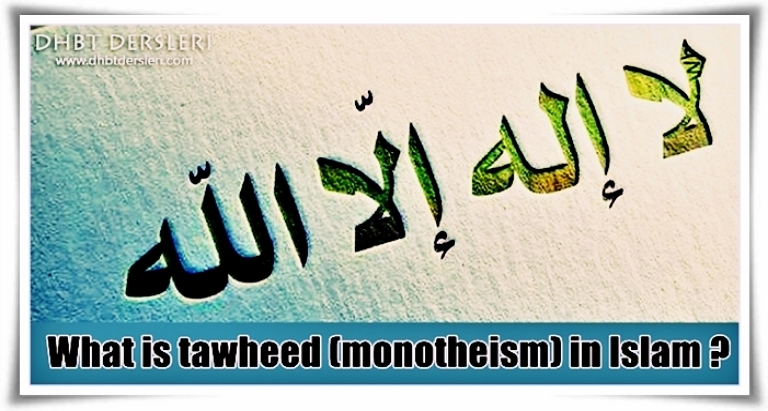What is tawheed (monotheism) in Islam ?
The first and foremost criteria anything and everything done in the name of Islam is tawheed (monotheism). Tawheed can be summarized in the phrase “La ilaha illa Allah” — “There is no deity but Allah.” The phrase is also known as “Al-Kalimah al-Tawheed.” This statement is the key to the faith of Islam and the underlying code of existence as such. Therefore, Prophet Muhammad described the spiritual weight of this declaration as “heavier than that of the universe.”
“La ilaha illa Allah” is composed of two halves: the first part (la ilaha) is the statement of negation: “there is no god,” and the second part (illa Allah) is affirmation: “There is only Allah.” The positive and negative polarity in this sentence encompasses all things in the universe.
For example, the polarity of a proton and a neutron in the nucleus of an atom, the centripetal and centrifugal forces that keep stars, planets and other celestial objects in their orbits and maintain their synchrony and harmony. In living beings, this polarity manifests itself in life and death. In breathing beings, it is observed in inhalation and exhalation.
In the digital industry, the “0” and “1” codes represent this concept. Everything in the universe is part of this cosmic choir that hymns the word of tawheed (la ilaha illa Allah), including the birth and death of the creation. Confirming tawheed defines belonging to the universe. Thus, “la ilaha illa Allah” is an invitation to human beings to behave in a morally responsible manner towards the universe, of which they are a part.
But, first and foremost, “la ilaha illa Allah” is the entry code to tawheed. One who enters the creed of tawheed by pronouncing the words “la ilaha illa Allah,” he/she pledges that:
- Allah is the meaning of everything that exists. Therefore, disconnecting anything from its Creator means cutting it off from its meaning and the purpose of its creation.
- All things are interconnected and everything is connected with the One; that is Allah.
- There is no aspect of life wherein Allah has no say, and there is no life that does not dependent on Him.
- Allah is one and creations are many.
Belief in polytheism is degrading of the Truth, and deification of the created is degrading of the dignity of being! All tyrants and oppressors are the products of the latter injustice. Eradicating anything from the order of the universe is against the will of Allah, even if they are objects of innocence and beauty or such abhorrent things as atheism. “And [thus it is:] had thy Sustainer so willed, all those who live on earth would surely have attained to faith (but he did not will)” (Yunus 10:99)
What is the difference between tawheed in Islam and the Christian concept of the Trinity ?
As the very names suggest, the two terms contradict each other. The belief in Oneness of Allah is the basis of Islam, while belief in a tripartite nature of Allah is a clear contradiction to that. Tawheed teaches that Allah is absolutely single, infinite and superior over any other entity; He has no partners and no being resembles Him; He has neither begotten nor He begets. Obviously, the concept of trinity speaks to the exact opposite of these teachings. Every single prophet of Allah sent to people shared the belief in the monotheistic nature of Allah. The concept of trinity was only introduced by Athenagoras some 150 years after Jesus the son of …
Mary lived on Earth. The concept was further systematized and institutionalized as the foundation of belief by chief church official Tertullian (160-220) who was influenced by other polytheistic cultures.
According to teachings of tawheed, a Muslim cannot pray to anyone but Allah; therefore, Prophet Muhammad cannot be worshipped. On the contrary, the concept of trinity divinizes the personality of Jesus the son of Mary (peace unto him) and legitimizes a Christian’s worship of him.
It is recorded that Prophet Muhammad has told his only surviving child before his death: “My daughter Fatima! Save yourself from the Hellfire with your good deeds. I swear by Allah, I cannot do anything for you in the Hereafter!” Further, according to teachings of tawheed, Prophet Muhammad’s body is not sacred. On the contrary, the concept of trinity sanctifies the body of Jesus son of Mary.
The concept of tawheed prohibits Muslims from deifying Prophet Muhammad. Doing so would be no different from worshiping idols. The concept of trinity, on the contrary, asserts that failing to recognize a deity in Jesus the son of Mary would disqualify one as a Christian.
What is the essence of servitude to Allah in Islam?
Humans’ servitude to Allah in Islam bears three meanings:
1. Not being a slave of one’s own desires: Islam opposes one’s falling slave to their own ego and corrupting desires. Should that happen, that person’s reason, will and consciousness would fall as well. The Qur’an describes this state of mind as turning desires into one’s deity (Furqan 25:43). Thus, being a slave to Allah is refusing to be enslaved by impulses and desires.
2. Not being a slave of another human: Islam prohibits enslavement of one human by another human. Those who do so along with those who agree to be enslaved—voluntarily or not— are equally accountable before Allah. This aspect of servitude to Allah protects humans from their fellow humans’ evils.
3. Not being a slave of worldly matters: Islam prohibits humans from enslavement to the world, power, money, status or any other matter. The goal here is preventing humans from becoming worldly creatures, which contradicts their purpose of creation. Should that happen, the human would place himself beneath other creatures on the hierarchy of creations.

































